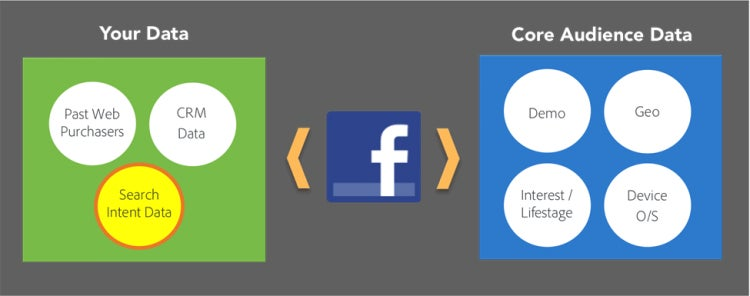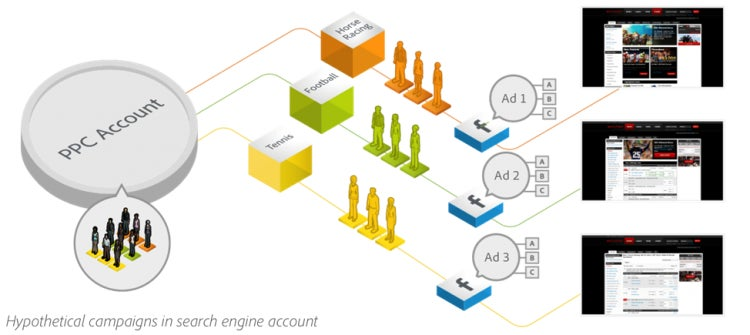Leveraging Search Intent Signals to Enhance Facebook Performance

Once primarily associated with display, programmatic advertising can now be described as simply the automation of media buying and optimization that’s centered on audiences.
When we think about it in this context, the meaning behind it has evolved, and extends more broadly across digital advertising. Search, as the first pure form of a programmatic channel, offered automation, transparency, and the ability to leverage data such as geography, time of day, or device type in order to make more intelligent decisions and to improve relevancy.
Search in the Era of Facebook
Enter Facebook®. The social network recently announced Q4 2014 revenues of $3.85 billion, up $2.59 billion year-over-year. Eighty-five percent of people on Facebook now access the network via mobile devices, and more than a third access it exclusively on mobile.
Facebook’s success stems both from its ability to scale audiences over a relatively short period and from its decision to embrace a programmatic approach, where data is the centerpiece. This data can be used to help make customer experiences more relevant, and in turn, to deliver better performance.
Facebook’s strength revolves around its core audience data that is unmatched by other media companies. However, it really upped the ante with the arrival of Custom Audiences, which has been in-market for multiple years now.
It quickly became Facebook’s most popular direct response solution for marketers. To create a custom audience, marketers upload a privacy-protected hashed file of first-party marketing data, including email addresses, phone numbers, user IDs, and Web data.
This is just one example of the convergence of advertising technology with marketing technology in the digital ecosystem, where Facebook is obviously a large player.
This journey of convergence is continuing to evolve with the introduction of cross-channel data. And what better channel to provide the richest signal for intent than Paid Search?

http://blogs.adobe.com/digitalmarketing/wp-content/uploads/2015/02/mon-search-retargeting-1.png
Retargeting: A New Era for Search
Enter search retargeting. With this option, a paid search campaign can be structured to capture real-time intent and consumer demand for a category of product, service, or brand.
The ability to segment audiences based on these campaign structures in an automated way, to match these highly valuable audiences on Facebook in real-time through Custom Audiences, and to deliver relevant messaging that resonates with people, provides a compelling way to programmatically close the loop for marketers.
It is similar to display retargeting in ensuring that warm in-market prospects keep a brand in mind and can return to that brand and convert when they are ready to buy.
Below is a hypothetical example of how search retargeting works on Facebook:

http://blogs.adobe.com/digitalmarketing/wp-content/uploads/2015/02/mon-search-rageting-2.png
Custom Audience Targeting: Matching Search Intent Data With Audiences
Adobe Media Optimizer has partnered with Facebook to match search intent data with their audiences through Custom Audience targeting. The ultimate goal was to drive better overall performance for our customers’ marketing efforts.
When compared to concurrent search campaigns, search retargeting on Facebook delivered a 16 percent uplift in conversions at similar spend levels for a global gaming company. When compared to concurrent Facebook campaigns, search retargeting delivered a whopping 45 percent uplift in conversion rate, and a 19 percent improvement in cost per acquisition.
At similar spend levels, search retargeting drove an amazing 63 percent uplift in conversions at similar spend levels to concurrent Facebook campaigns. Search retargeting accounted for 13 percent of total Facebook conversions for this customer.
Adobe’s data showed that search retargeting accounted for 13 percent of total Facebook conversions for this customer. This ROI demonstrates that by leveraging search intent data on Facebook, marketers can very efficiently increase social conversions by 10 to 15 percent.
Facebook® is a registered trademark of Facebook, Inc.

https://theblog.adobe.com/experience-cloud/advertising-cloud/